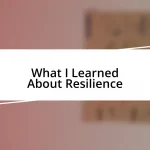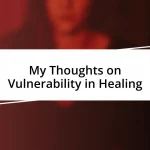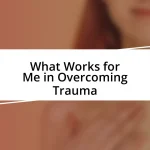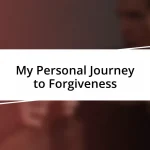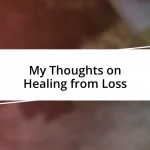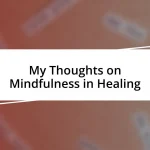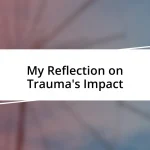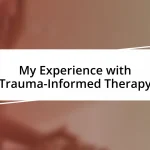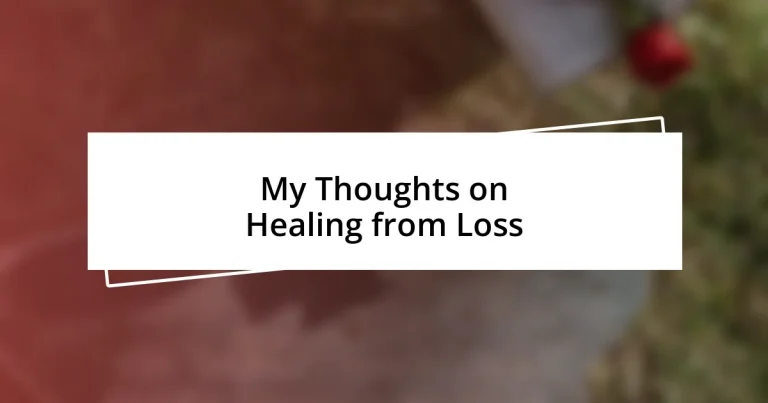Key takeaways:
- Loss manifests in various forms and prompts reflection on the importance of relationships and moments.
- The stages of grief (Denial, Anger, Bargaining, Depression, Acceptance) are experienced uniquely and are not linear.
- Community support and shared experiences play a vital role in the healing journey, offering comfort and encouragement.
- Finding meaning after loss can be fostered through creative expression, journaling, and helping others, which can transform grief into purpose.
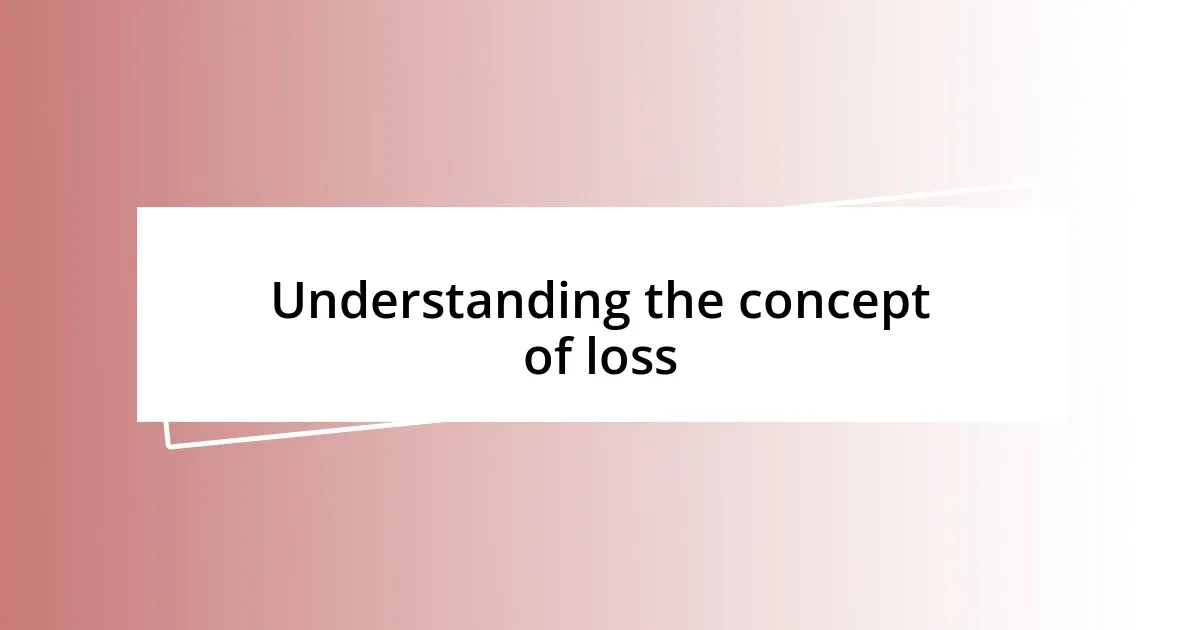
Understanding the concept of loss
Loss is a profound experience that each of us faces at some point in life. I remember the day I lost my grandmother; it felt like the ground shifted beneath me. How could someone who had been so present in my life just… disappear? That moment ignited a whirlpool of emotions, highlighting how loss can disrupt our sense of stability.
When we think about loss, it’s essential to recognize that it manifests in various forms, not just through death. I once lost a close friendship that had spanned years, and the ache of that absence felt just as tangible. Have you ever experienced a shift in your life that left a void? It’s interesting how loss can lead us to reevaluate what truly matters, prompting us to cherish relationships and moments in a way we might have taken for granted.
Understanding loss means acknowledging that it’s an integral part of the human experience. On some level, we all grapple with it; it teaches us resilience, even if the lessons come from pain. Each time I reminisce about my grandmother or that friendship, I realize that while the void remains, the love and memories shared also help shape who I’ve become. What aspects of loss resonate with you?
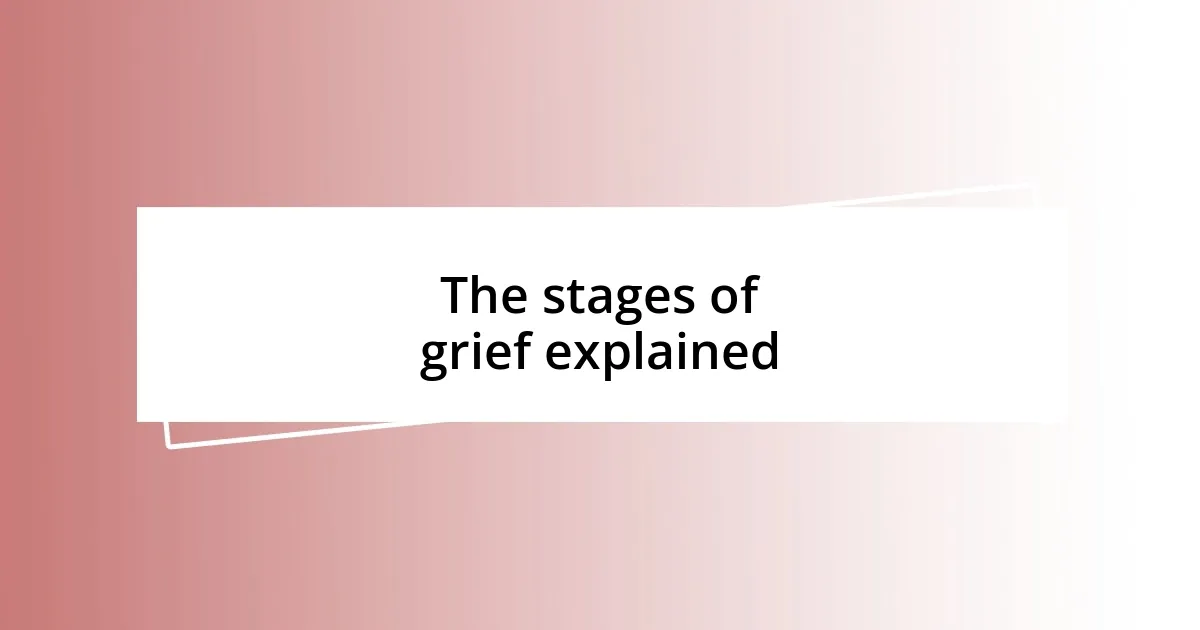
The stages of grief explained
The journey through grief is often depicted as a series of stages, though everyone experiences these feelings uniquely. I can recall a particularly striking moment when I was enveloped by an overwhelming wave of sadness after the loss of my childhood pet; it was as if the air itself grew heavy. I learned that grief isn’t linear—sometimes you find yourself oscillating between stages, like backtracking through a maze that has no clear entrance or exit.
Here are the commonly recognized stages of grief:
- Denial: The initial shock and disbelief can leave you feeling numb, as if the reality of your loss hasn’t yet registered.
- Anger: This stage often emerges as a way to cope with the frustration and helplessness, and can be directed towards others, yourself, or even the situation.
- Bargaining: In moments of desperation, you might find yourself negotiating with fate—thinking about what could have been done differently to prevent the loss.
- Depression: Deep sorrow sets in, and you may feel isolated; I remember sitting in silence for hours, processing the void that my pet’s absence created in my life.
- Acceptance: While it doesn’t mean forgetting, this stage allows you to acknowledge the loss and begin rebuilding a life that honors the memory of what was lost.
As I transitioned through these stages, I often reflected on the enduring impact of my experiences, realizing that, while painful, they crafted a deeper understanding of love and attachment. Grief teaches us about our capacity to heal, even if the path isn’t always straightforward.
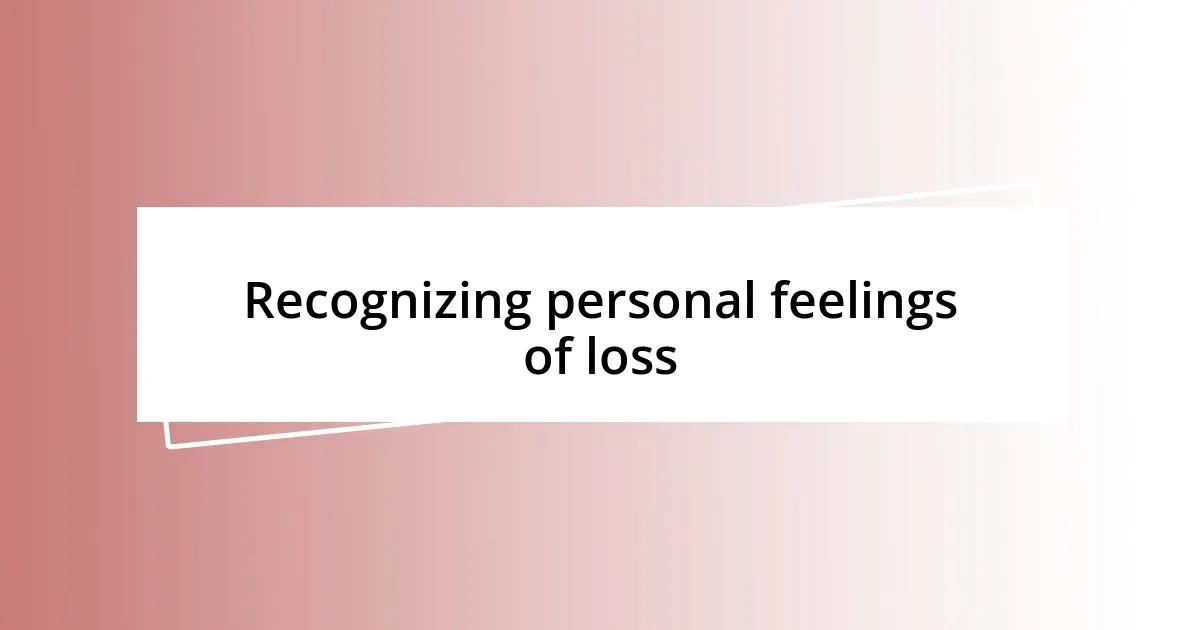
Recognizing personal feelings of loss
Recognizing personal feelings of loss is a crucial part of the healing process. I remember vividly the feeling of emptiness that suffocated me when I learned about my friend’s sudden passing. It’s almost like I was in a fog; familiar sensations turned foreign. Acknowledging that deep sadness allowed me to articulate grief instead of burying it under a facade of strength.
Grasping my personal feelings of loss also meant paying attention to the unexpected waves of grief that often surfaced at odd moments. For instance, I found myself tearing up in the middle of a mundane grocery trip when a song reminded me of my friend. These raw emotions taught me to be patient with myself and to recognize loss as a deeply personal journey. Have you noticed how your emotions can catch you off guard like that?
This journey of recognition is inherently individual. As I navigated through my feelings, I realized that guilt and anger were common companions. There were times I felt angry at myself for moving forward. Yet, with time, I learned that recognizing these feelings isn’t about assigning blame; it’s about understanding the complex tapestry of emotions that accompany loss.
| Feelings of Loss | Emotions Experienced |
|---|---|
| Deep Sadness | Grief, Despair |
| Unexpected Tears | Surprise, Vulnerability |
| Guilt and Anger | Frustration, Self-blame |
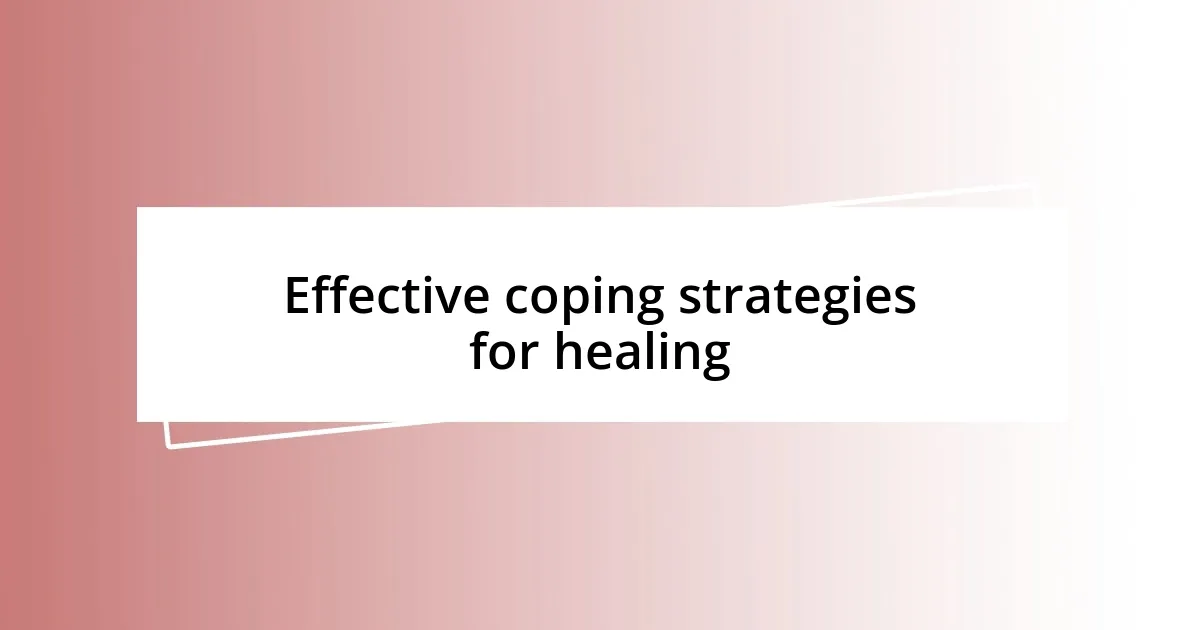
Effective coping strategies for healing
Finding effective coping strategies for healing is essential on this challenging journey. One approach that proved invaluable for me was immersing myself in creative expression. After losing a close family member, I took up painting as a way to channel my emotions. The brush strokes allowed me to articulate my feelings on canvas instead of forcing them into words—it’s surprising how much clarity can emerge from colors and textures, don’t you think?
Another strategy that resonated with me is connecting with supportive communities. I joined a grief support group, where I found solace in sharing my story and hearing others. It felt refreshing to know others walked similar paths; their experiences mirrored my own grief and reminded me that I wasn’t alone. Have you ever shared your feelings with someone and felt an instant relief wash over you? That sense of connection can be a powerful motivator for healing.
Lastly, I discovered the healing power of mindfulness and meditation. In moments when the pain felt too heavy, I turned to simple breathing exercises. Sitting quietly and focusing on my breath helped ground me in the present moment, creating a space for peace amid chaos. Have you tried these mind-calming techniques? They remind us that while grief can be consuming, we have the ability to cultivate moments of tranquility and reflection.
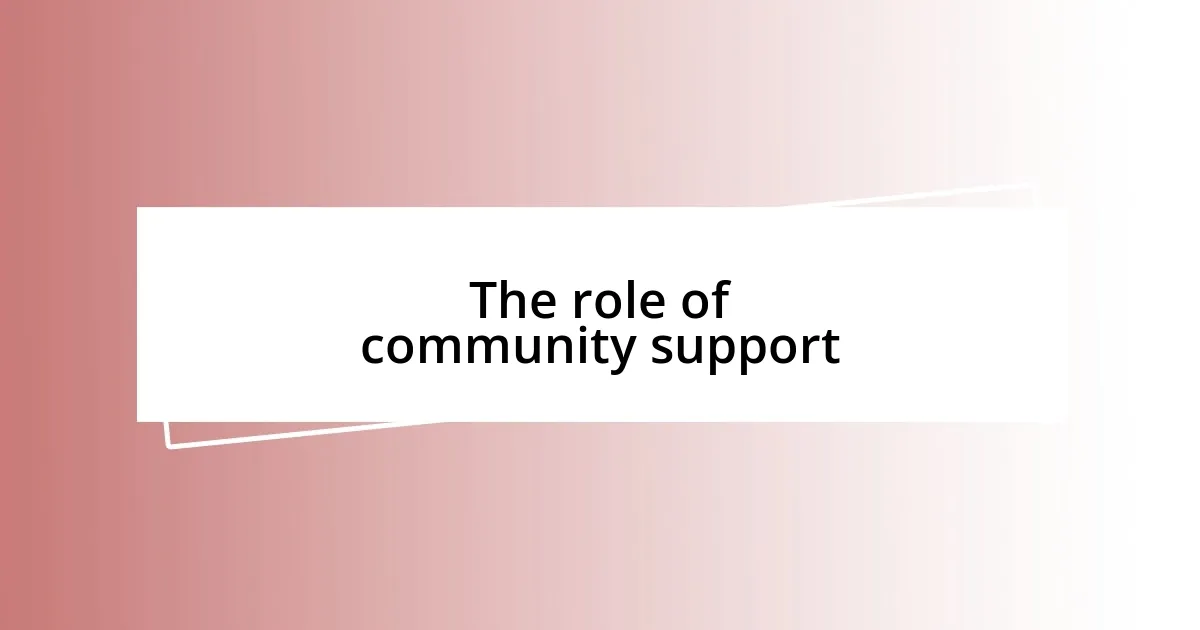
The role of community support
Community support plays an essential role in healing from loss, often providing a much-needed safety net. I distinctly remember attending a gathering of friends after my loss. We shared stories, laughter, and tears, creating a space where vulnerability felt safe and comfortable. It struck me how simply being surrounded by those who cared made the burden feel lighter—have you experienced that comfort in connection?
I realized that support isn’t solely about sharing grief; it’s also about encouragement during the healing process. At times when I hesitated to take steps forward, my community gently pushed me, reminding me of my strength and resilience. Their belief in me was like a warm blanket on a cold night—do you have people in your life who uplift you during difficult moments?
The power of community transcends mere companionship; it fosters a sense of understanding and belonging. I remember receiving heartfelt notes from acquaintances who had also faced loss. Their words of empathy resonated deeply, creating an unspoken bond between us. It made me think—how often do we underestimate the strength found in collective experiences? Together, shared grief morphs into shared healing, reminding us that we are never truly alone in our sorrow.
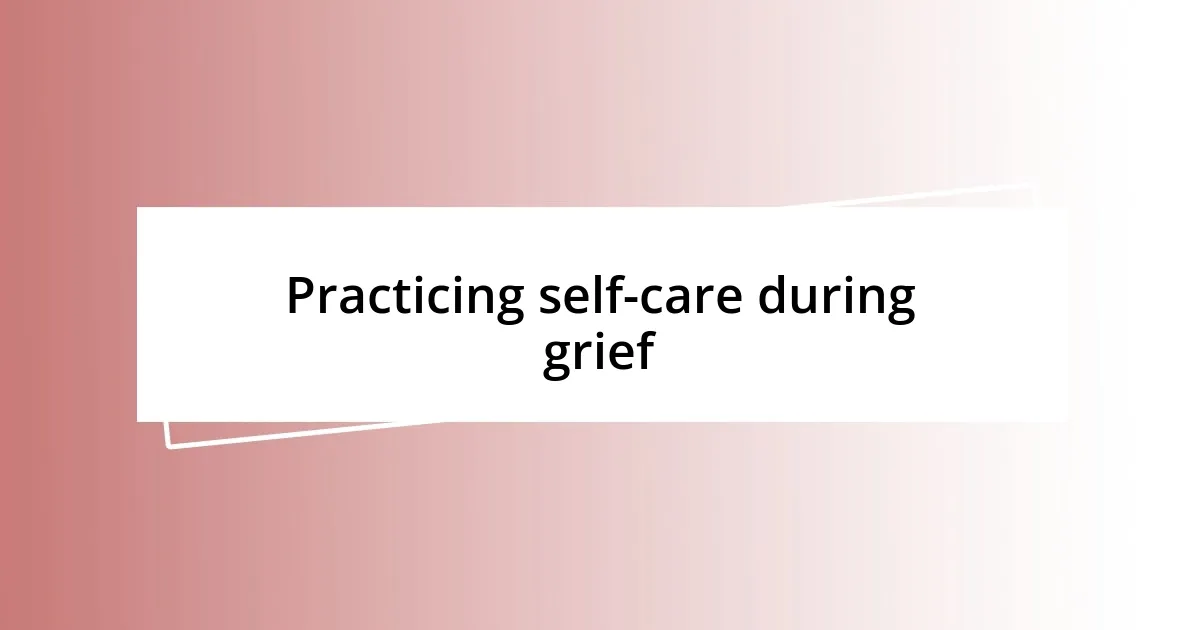
Practicing self-care during grief
Practicing self-care during grief is crucial for navigating the emotional waves that follow loss. I remember those days when getting out of bed felt monumental. On particularly tough mornings, I’d force myself to do something small, like enjoying a warm cup of tea while watching the sunrise. Simple acts of nurturing oneself can provide a tiny sense of normalcy amidst the chaos of grief.
I’ve also found that engaging in physical activity can serve as a profound form of self-care. When the weight of sorrow pressed heavily on my chest, I often took long walks in nature. There’s something so healing about feeling the earth beneath my feet—breathing in fresh air, surrounded by the simple beauty of trees and birds. Have you ever noticed how a brisk walk can rejuvenate your spirit, even when you least expect it? It truly works wonders for both mind and body.
Moreover, allowing myself to feel sad without judgment became a powerful self-care tool. One evening, I found myself curled up on the couch, letting tears flow freely while watching old family videos. I learned it’s okay to sit with those painful emotions rather than pushing them away. In those moments, I realized embracing grief was also a form of honoring the love I lost. Isn’t it fascinating how vulnerability can also lead to profound healing?
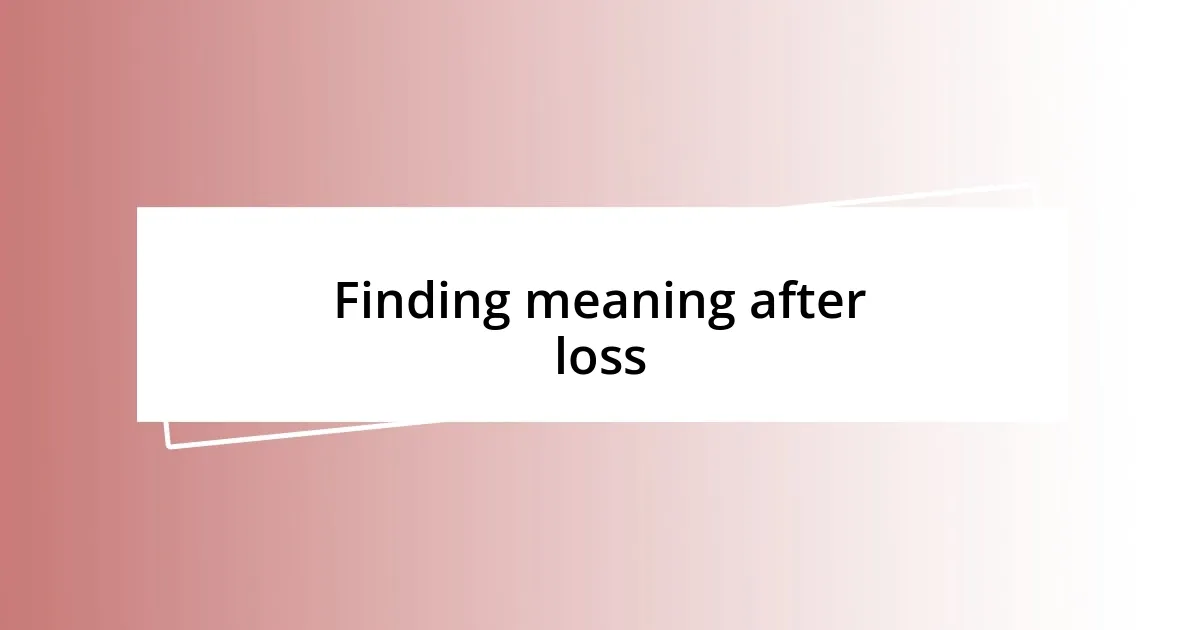
Finding meaning after loss
Finding meaning after a loss can feel like searching for a glimmer of light in a thick fog. I recall feeling utterly lost in my grief, wondering how I could possibly move forward. It wasn’t until I started journaling that I began to uncover my thoughts and emotions. Putting pen to paper became a grounding experience, revealing insights that I hadn’t realized were buried deep within me. Have you ever tried journaling? It’s amazing how expressing feelings can help untangle the messiness of loss.
As time passed, I discovered that embracing the memories of what was lost could breathe new life into my journey. I often found myself revisiting places that held significance—like my favorite café where we used to laugh over endless cups of coffee. Those memories allowed me to celebrate what I had, reminding me that love doesn’t disappear; it simply transforms. It made me wonder—what memories do you cherish that keep the spirit of your loved one alive?
A pivotal moment for me was when I started volunteering at a local community center, channeling my grief into giving back. Helping others who were facing their own challenges provided a sense of purpose I didn’t know I was missing. As I listened to their stories, I realized the importance of connection and shared humanity. It’s remarkable how healing can arise from making a difference in someone else’s life. Have you thought about how your experiences can inspire those around you? Finding meaning often lies in the ways we uplift others through our own journeys.
